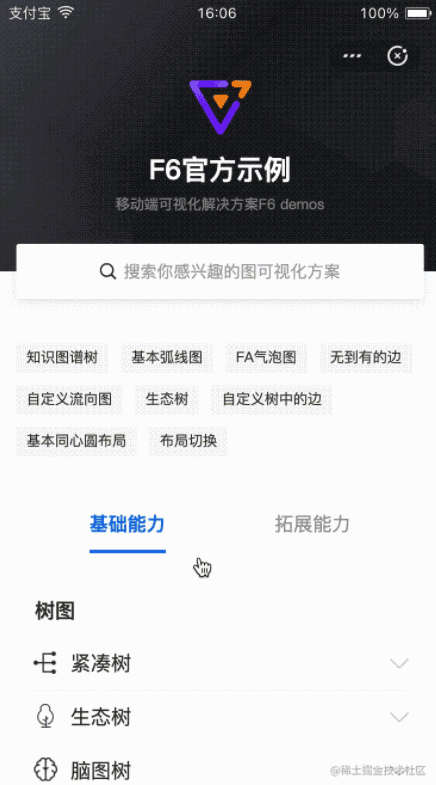什么是思维导图?怎么在小程序中绘制思维导图?下面本篇文章给大家介绍一下使用F6在小程序中绘制思维导图的方法,希望对大家有所帮助!

什么是思维导图?
思维导图(英语:mind map),又称脑图、心智地图、头脑风暴图、心智图、灵感触发图、概念地图、或思维地图,是一种用图像整理信息的图解。它用一个中央关键词或想法以辐射线形连接所有的代表字词、想法、任务或其它关联项目。它可以利用不同的方式去表现人们的想法,如引题式、可见形象化式、建构系统式和分类式。它普遍地用作在研究、组织、解决问题和政策制定中。《维基百科》
思维导图是由英国的托尼·博赞于1970年代提出的一种辅助思考工具。以目标主题为中心节点不断向外延展关联,不断分解和探索,最终形成一张完整的树状图。从具体的操作过程来看,也可以理解为对探索过程的可视化,完整记录了每一次关联的结果。这种形式更加符合人的思考方式,最后的图也让我们对主题更有体感和整体的了解。

正因为思维导图的关注点在于思考,而我们的正常活动离不开思考,所以思维导图有非常广泛的使用场景。比如总结归纳、报告演示、头脑风暴等。实施起来只需要纸笔足以,当然也有丰富的在线、独立应用可以支持到图的制作。如果我们的产品需要展示围绕一个主题的多层关联信息的时候,便可以采用思维导图的形式。F6可以很方便地在小程序中绘制脑图,比如上图的效果,有相关需求的同学值得一试。【相关学习推荐:小程序开发教程】
F6中如何绘制
演示示例可以参考f6.antv.vision/zh/docs/exa…本节代码已经开源,感兴趣可以查看
支付宝中
首先安装
npm install @antv/f6 @antv/f6-alipay -S
data.js
export default {
id: 'Modeling Methods',
children: [
{
id: 'Classification',
children: [
{
id: 'Logistic regression',
},
{
id: 'Linear discriminant analysis',
},
{
id: 'Rules',
},
{
id: 'Decision trees',
},
{
id: 'Naive Bayes',
},
{
id: 'K nearest neighbor',
},
{
id: 'Probabilistic neural network',
},
{
id: 'Support vector machine',
},
],
},
{
id: 'Consensus',
children: [
{
id: 'Models diversity',
children: [
{
id: 'Different initializations',
},
{
id: 'Different parameter choices',
},
{
id: 'Different architectures',
},
{
id: 'Different modeling methods',
},
{
id: 'Different training sets',
},
{
id: 'Different feature sets',
},
],
},
{
id: 'Methods',
children: [
{
id: 'Classifier selection',
},
{
id: 'Classifier fusion',
},
],
},
{
id: 'Common',
children: [
{
id: 'Bagging',
},
{
id: 'Boosting',
},
{
id: 'AdaBoost',
},
],
},
],
},
{
id: 'Regression',
children: [
{
id: 'Multiple linear regression',
},
{
id: 'Partial least squares',
},
{
id: 'Multi-layer feedforward neural network',
},
{
id: 'General regression neural network',
},
{
id: 'Support vector regression',
},
],
},
],
};index.json
{
"defaultTitle": "mindMap",
"usingComponents": {
"f6-canvas": "@antv/f6-alipay/es/container/container"
}
}index.js
import F6 from '@antv/f6';
import TreeGraph from '@antv/f6/dist/extends/graph/treeGraph';
import { wrapContext } from '../../../common/utils/context';
import data from './data';
/**
* 脑图-自节点自动两侧分布
*/
Page({
canvas: null,
ctx: null,
renderer: '', // mini、mini-native等,F6需要,标记环境
isCanvasInit: false, // canvas是否准备好了
graph: null,
data: {
width: 375,
height: 600,
pixelRatio: 2,
forceMini: false,
},
onLoad() {
// 注册自定义树,节点等
F6.registerGraph('TreeGraph', TreeGraph);
// 同步获取window的宽高
const { windowWidth, windowHeight, pixelRatio } = my.getSystemInfoSync();
this.setData({
width: windowWidth,
height: windowHeight,
pixelRatio,
});
},
/**
* 初始化cnavas回调,缓存获得的context
* @param {*} ctx 绘图context
* @param {*} rect 宽高信息
* @param {*} canvas canvas对象,在render为mini时为null
* @param {*} renderer 使用canvas 1.0还是canvas 2.0,mini | mini-native
*/
handleInit(ctx, rect, canvas, renderer) {
this.isCanvasInit = true;
this.ctx = wrapContext(ctx);
this.renderer = renderer;
this.canvas = canvas;
this.updateChart();
},
/**
* canvas派发的事件,转派给graph实例
*/
handleTouch(e) {
this.graph && this.graph.emitEvent(e);
},
updateChart() {
const { width, height, pixelRatio } = this.data;
// 创建F6实例
this.graph = new F6.TreeGraph({
context: this.ctx,
renderer: this.renderer,
width,
height,
pixelRatio,
fitView: true,
modes: {
default: [
{
type: 'collapse-expand',
onChange: function onChange(item, collapsed) {
const model = item.getModel();
model.collapsed = collapsed;
return true;
},
},
'drag-canvas',
'zoom-canvas',
],
},
defaultNode: {
size: 26,
anchorPoints: [
[0, 0.5],
[1, 0.5],
],
},
defaultEdge: {
type: 'cubic-horizontal',
},
layout: {
type: 'mindmap',
direction: 'H',
getHeight: function getHeight() {
return 16;
},
getWidth: function getWidth() {
return 16;
},
getVGap: function getVGap() {
return 10;
},
getHGap: function getHGap() {
return 50;
},
},
});
let centerX = 0;
this.graph.node(function(node) {
if (node.id === 'Modeling Methods') {
centerX = node.x;
}
// position的取值(由于ESlint禁止嵌套的三元表达,所以单独提取出来写)
let position_value = null;
if (node.children && node.children.length > 0) {
position_value = 'left';
} else if (node.x > centerX) position_value = 'right';
else position_value = 'left';
return {
label: node.id,
labelCfg: {
offset: 5,
position: position_value,
},
};
});
this.graph.data(data);
this.graph.render();
this.graph.fitView();
},
});index.axml
<f6-canvas
width="{{width}}"
height="{{height}}"
forceMini="{{forceMini}}"
pixelRatio="{{pixelRatio}}"
onTouchEvent="handleTouch"
onInit="handleInit"
></f6-canvas>微信中
首先安装
npm install @antv/f6-wx -S
@antv/f6-wx 由于微信对npm包不是很友好,所以我们分装了 @antv/f6-wx 帮助用户简化操作。
data.js 同上
index.json
{
"defaultTitle": "脑图",
"usingComponents": {
"f6-canvas": "@antv/f6-wx/canvas/canvas"
}
}index.wxml
<f6-canvas
width="{{width}}"
height="{{height}}"
forceMini="{{forceMini}}"
pixelRatio="{{pixelRatio}}"
bind:onTouchEvent="handleTouch"
bind:onInit="handleInit"
></f6-canvas>index.js
import F6 from '@antv/f6-wx';
import TreeGraph from '@antv/f6-wx/extends/graph/treeGraph';
import data from './data';
/**
* 脑图-自节点自动两侧分布
*/
Page({
canvas: null,
ctx: null,
renderer: '', // mini、mini-native等,F6需要,标记环境
isCanvasInit: false, // canvas是否准备好了
graph: null,
data: {
width: 375,
height: 600,
pixelRatio: 1,
forceMini: false,
},
onLoad() {
// 注册自定义树,节点等
F6.registerGraph('TreeGraph', TreeGraph);
// 同步获取window的宽高
const { windowWidth, windowHeight, pixelRatio } = wx.getSystemInfoSync();
this.setData({
width: windowWidth,
height: windowHeight,
// pixelRatio,
});
},
/**
* 初始化cnavas回调,缓存获得的context
* @param {*} ctx 绘图context
* @param {*} rect 宽高信息
* @param {*} canvas canvas对象,在render为mini时为null
* @param {*} renderer 使用canvas 1.0还是canvas 2.0,mini | mini-native
*/
handleInit(event) {
const {ctx, rect, canvas, renderer} = event.detail
this.isCanvasInit = true;
this.ctx = ctx;
this.renderer = renderer;
this.canvas = canvas;
this.updateChart();
},
/**
* canvas派发的事件,转派给graph实例
*/
handleTouch(e) {
this.graph && this.graph.emitEvent(e.detail);
},
updateChart() {
const { width, height, pixelRatio } = this.data;
// 创建F6实例
this.graph = new F6.TreeGraph({
context: this.ctx,
renderer: this.renderer,
width,
height,
pixelRatio,
fitView: true,
modes: {
default: [
{
type: 'collapse-expand',
onChange: function onChange(item, collapsed) {
const model = item.getModel();
model.collapsed = collapsed;
return true;
},
},
'drag-canvas',
'zoom-canvas',
],
},
defaultNode: {
size: 26,
anchorPoints: [
[0, 0.5],
[1, 0.5],
],
},
defaultEdge: {
type: 'cubic-horizontal',
},
layout: {
type: 'mindmap',
direction: 'H',
getHeight: function getHeight() {
return 16;
},
getWidth: function getWidth() {
return 16;
},
getVGap: function getVGap() {
return 10;
},
getHGap: function getHGap() {
return 50;
},
},
});
let centerX = 0;
this.graph.node(function(node) {
if (node.id === 'Modeling Methods') {
centerX = node.x;
}
// position的取值(由于ESlint禁止嵌套的三元表达,所以单独提取出来写)
let position_value = null;
if (node.children && node.children.length > 0) {
position_value = 'left';
} else if (node.x > centerX) position_value = 'right';
else position_value = 'left';
return {
label: node.id,
labelCfg: {
offset: 5,
position: position_value,
},
};
});
this.graph.data(data);
this.graph.render();
this.graph.fitView();
},
});欢迎讨论
对于思维导图,或者图可视化感兴趣,都可以添加我的微信 openwayne 进入我们的微信群讨论。
更多编程相关知识,请访问:编程入门!!
以上是什么是思维导图?怎么使用F6在小程序中绘制思维导图?的详细内容。更多信息请关注PHP中文网其他相关文章!

热AI工具

Undresser.AI Undress
人工智能驱动的应用程序,用于创建逼真的裸体照片

AI Clothes Remover
用于从照片中去除衣服的在线人工智能工具。

Undress AI Tool
免费脱衣服图片

Clothoff.io
AI脱衣机

AI Hentai Generator
免费生成ai无尽的。

热门文章

热工具

SublimeText3 Mac版
神级代码编辑软件(SublimeText3)

PhpStorm Mac 版本
最新(2018.2.1 )专业的PHP集成开发工具

安全考试浏览器
Safe Exam Browser是一个安全的浏览器环境,用于安全地进行在线考试。该软件将任何计算机变成一个安全的工作站。它控制对任何实用工具的访问,并防止学生使用未经授权的资源。

SublimeText3 Linux新版
SublimeText3 Linux最新版

MinGW - 适用于 Windows 的极简 GNU
这个项目正在迁移到osdn.net/projects/mingw的过程中,你可以继续在那里关注我们。MinGW:GNU编译器集合(GCC)的本地Windows移植版本,可自由分发的导入库和用于构建本地Windows应用程序的头文件;包括对MSVC运行时的扩展,以支持C99功能。MinGW的所有软件都可以在64位Windows平台上运行。





